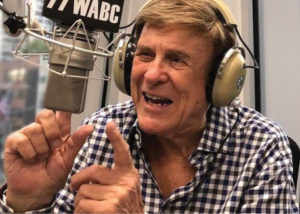A familiar radio voice is again being heard on the airwaves over Westchester, Connecticut, about 40 states and parts of Canada, too. “Cousin” Bruce Morrow has returned to WABC radio, the powerhouse AM station that blankets a huge slice of North America with its nighttime signal.
 Cousin Brucie, as he has been known to his legions of fans over the years, began his career as a New York radio personality at WINS in 1959 when it was a Top 40 music station, before switching to an all-news format. He then left for a brief stint at a station in Miami, returning to New York at WABC where he was heard through the 60s and into 1974. Morrow then switched to New York’s WNBC, ending the 1970s as co-owner of a group of stations that included outlets in Orange County.
Cousin Brucie, as he has been known to his legions of fans over the years, began his career as a New York radio personality at WINS in 1959 when it was a Top 40 music station, before switching to an all-news format. He then left for a brief stint at a station in Miami, returning to New York at WABC where he was heard through the 60s and into 1974. Morrow then switched to New York’s WNBC, ending the 1970s as co-owner of a group of stations that included outlets in Orange County.
Morrow’s popularity as a radio personality continued all the while through his nationally-syndicated rock and roll shows, locally in New York on WCBS-FM, then Sirius XM satellite radio and now, once again, WABC where on Sept. 5 “Cousin Brucie’s Saturday Night Rock & Roll Party” had its premiere. The program also is heard on WLIR-FM in Hampton Bays on Long Island and on the internet. To add to the atmosphere, Cousin Brucie’s new show is featuring the original promotional jingles used by WABC when it was playing rock and roll music.
“People ask me my favorite songs. If I go to the ’50s, right away I think of Chuck Berry, Elvis and the Everly Brothers. I think of doo-wop. Then I go to the ’60s. Immediately I have to think of the Beatles, the Stones and the Hollies,” Cousin Brucie told the Business Journal while he was at his country home in Ulster County. “In the ’70s, I think of Linda Ronstadt, and I think of Eric Clapton. It’s difficult for me to pick a favorite, but I’d probably have to say the Beatles. They had an effect on me personally, on my career and on radio.”
During its heyday as a Top 40 music station, in addition to being known as “Musicradio 77 WABC,” disc jockeys would replace the station’s call letters W-A-B-C with the slogan “W-A-Beatle-C.” When the Beatles took the U.S. by storm, Morrow introduced them along with newspaper columnist and TV personality Ed Sullivan at their August 1965 Shea Stadium concert. Morrow was selected to be the first to broadcast their record “I Want To Hold Your Hand.”
“When their record ‘I Want To Hold Your Hand’ came out, it was brought to me at the radio station by an armed guard, carrying it in an attache case handcuffed to his wrist. At exactly nine o’clock, he opened his handcuffs and handed me the record which I played on the air. I played it eight times that night,” Morrow said. “Stations in 40 states copied that record off the air. As I played it, they made recordings and then played it. People at other radio stations didn’t care how they got it. They just wanted it.”
Morrow was inducted into the National Radio Hall of Fame in 1988 and the National Association of Broadcasters Hall of Fame in 2001.
The Brooklyn native said that with his new show on WABC surrounded by talk programming, he considers the three hours he does on Saturdays from 6 to 9 p.m. as an oasis for people looking for a little relaxation and escape and even a friendly voice.
“Right now in this world of ours we certainly need escape. I’ve always been very lucky since the beginning of my major career that I’ve been accepted in peoples’ homes and families. When I’m on the air, I’m with people in their homes and cars, I go places with people, and I’m accepted as a family member,” Morrow said. He said he and his wife Jody often are invited by listeners to attend their family celebrations and events. “People really feel this relationship, this bridge, between this microphone and their lives. I’m very fortunate.”
Morrow said that the acceptance he has received from audiences brings with it a responsibility to provide what they’re looking for.
“When I go on the air, there is nothing political. I don’t want to talk about Covid. I don’t want to talk about any news events. I want people to have these three hours to get away from paying bills. I want them to think about easier times,” Morrow said.
“We all tend sociologically and psychologically to romanticize a better time, which is our youth. You want it back very badly because you perceive it was an easier time of life and a happy time of life,” Morrow said, “The music was much more simplistic. It was not an angry era. By the time we got into the 60s we were getting into some good poetry, some good rock and roll. The technology was improving, the distribution of the records was very good by this time and radio was getting very good. FM was growing but the average household had four-and-a-half AM radios in it. I was right there in the middle of that. I was very lucky.”
Morrow said that content is always king in broadcasting while evolving technology has made it easier for people to find exactly what they want when they want it.
“The audience today is very sophisticated. They know what they want. Between newspapers, magazines, radio, television, computers, they demand a good stream of entertainment and information,” Morrow said. “In the 60s, when I was on the air on WABC, I was reaching half the country, maybe more with the AM radio signal bouncing off the ionosphere. Today, this monster radio station WABC is amplified maybe 200-fold with streaming, internet, Google, Alexa, Siri. I always tell people if you open your refrigerator I’ll be in there, too.”
Morrow said that preparation for his Saturday night show begins at home during the week, long before he drives to the Manhattan studio.
“I’ll prepare a rundown. While I’m picking the music from the 50s, 60s and 70s, in the middle of all this I leave what I call ‘Cousin Brucie Space,’ which will be for telephone requests. The audience will tell me how they’re feeling, what they’re doing at home. They may plug a charity, and then they’ll pick a song. Magic happens during those three hours,” Morrow said. ”Going back to WABC is like going home.”




















